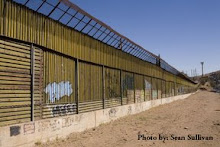Last month,
the Pew Hispanic Center reported that net migration from Mexico into the United
States has dropped
to zero, with roughly the same number of Mexican citizens heading south
across the border as north.
Just a few
days earlier, HR 1505, the misnamed National Security and Federal Lands
Protection Act, was introduced onto the floor of the U.S. House of Representatives
by Representative Rob Bishop (R-Utah).
Aimed at stopping the flood of immigrants that Pew found are, in fact, not
pouring over our borders, this bill waives 36 laws on all federal lands within
100 miles of both the northern and southern U.S. borders for any Border Patrol
activity. Forward operating bases,
roads, and even more border walls could tear through national parks from
Glacier to Olympic to Big Bend, as well as national forests, national
monuments, wildlife refuges, and wilderness areas with no concern for the laws
that protect natural ecosystems or human communities.
HR 1505 is a
dramatic expansion of the Real ID Act, which gave the Secretary of Homeland
Security the power to waive laws to build border walls and roads. In 2008 former DHS Secretary Chertoff waived
these same laws, which include the Endangered Species Act, Farmland Policy
Protection Act, and the Native American Graves Protection and Repatriation Act
to build walls that would otherwise have been illegal.
The
resulting damage has been tremendous.
Walls now carve up the Lower Rio Grande Valley National Wildlife Refuge,
fragmenting habitat set aside for endangered ocelot and jaguarundi. Up and down the Rio Grande, farmers and
ranchers, some of whose families have held title to their land since the
1760’s, have had their property condemned.
And during border wall construction ancestral remains were unearthed and
left exposed by bulldozers in the Tohono O’Odham reservation.
Now
Representative Bishop, whose Utah district is hundreds of miles away from
either border, wants to see this brutalizing of our borderlands expanded to
cover lands that are nowhere near the border.
He has yet to explain why he believes that the Border Patrol is
incapable of enforcing immigration laws without violating every other law.
For their
part, the Border Patrol has not asked for the power to ignore our nation’s
laws, and they have told Congressional researchers that “land management laws have had no
effect on Border Patrol’s overall measure of border security.” The current Secretary of
Homeland Security, former Arizona governor Janet Napolitano, recently called HR
1505 “unnecessary” and “bad policy.”
One would
assume that those who represent border communities would stand up for the
borderlands. Yet Representative Francisco Canseco, whose
district already contains more miles of border wall than any other in Texas, is
one of HR
1505’s cosponsors. The city of Eagle
Pass, whose residents are Rep. Canseco’s constituents, was on the receiving end
of the very first border wall condemnation.
Big Bend National Park is also in his district, and HR 1505 would sweep
aside all of the environmental laws that currently protect and maintain it.
Some of Texas’ other border Representatives have taken the opposite position, asserting that all of our nation’s laws should be enforced on the border, not just those that pertain to immigration. Representative Ruben Hinojosa, for example, whose district includes the Lower Rio Grande Valley National Wildlife Refuge, criticized HR 1505, saying, “I think we can allow the Border Patrol to do its work and at the same time protect our environment and our rare animals such as the jaguarundi, the ocelot and our migrating birds in deep South Texas.”
It may be that the difference between the two Representatives’ positions comes down to experience: Hinojosa saw first-hand the harm inflicted upon the border by the waiving of laws, while Canseco did not come to office until the Tea Party’s surge in 2010. Or perhaps it is a matter of party affiliation, as Conseco’s Grand Old Party tries to use immigrant bashing and charges that President Obama has not done enough to secure the border as a wedge issue in the upcoming election, ignoring the Pew findings and facts on the ground.
Representative Bishop is
currently working hard to convince Democrats, particularly those whose
districts are as far from the borders has his own and who he assumes know as
little about the borders as him, to support HR 1505. Bipartisan support would increase the bill’s
chances in the Senate, and make a Presidential veto unlikely.
Whether he comes to his decision
out of ignorance or politics, Representative Canseco needs to think about the
on-the-ground impacts of the National Security and Federal Lands
Protection Act on his constituents and the lands they cherish. He and other members of Congress need to
decide whether they stand for partisan politics or stand up for the people who
put them in office. And when the next
election comes around border residents need to think seriously about which side
their Representatives in Washington are on.





1 comment:
Great Post
Post a Comment